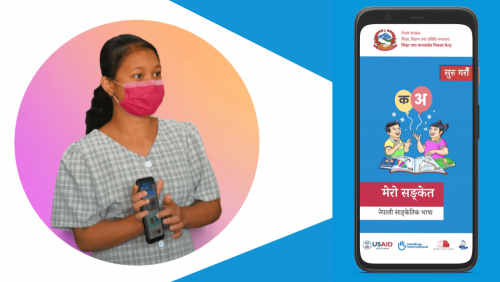
https://www.hi-us.org/news-hi-nepal-sign-language-app-opens-new-path-lea...
Called Mero Sanket, the app is the first of its kind for Nepal, can also help teachers, parents, and caregivers to learn basic Nepali sign language, and will be available as an offline platform.
The app was developed as part of the USAID-supported Reading for All program, which is implemented by Humanity & Inclusion in partnership with World Education, the National Federation of the Deaf Nepal (NDFN), the Center for Education and Human Resource Development (CEHRD) and other local partners. In Nepal, children with disabilities face unique challenges in accessing meaningful and inclusive education. They experience a lack of proper learning infrastructure and accessible instruction materials adapted to their needs. In Nepal, 15,000 Deaf students attend 24 specialized schools with 174 resource classrooms. Nepali sign language was developed in 1998 and has rapidly progressed, helping students who are deaf excel in their education and communication. However, Nepali sign language is not accessible in all parts of the country, which has resulted in disproportionate high school dropout rates for Deaf students.
“Inclusion is at the heart of Humanity & Inclusion’s core values and accessibility in communication is our mandate," explains Reiza Dejito, director of Humanity & Inclusion's activities in Nepal, India and Sri Lanka. "When children’s access to education is curtailed due to Covid-19 containment measures, and when children are confined to their homes, this ingenious app helps Deaf children to continue learning. The starting point was creating a tailor-made mobile app for learning Nepali sign language, and making it fun and on demand to anyone, anytime, anywhere."
In a statement, the National Federation of the Deaf Nepal wrote, “This app puts Nepali Sign Language into the hands of anyone with an interest in learning it. In creating this mobile app, we appreciate the support provided by the Government of Nepal, USAID, Humanity & Inclusion, World Education, and all technical teams involved. In the days to come, we wish to take more initiatives to promote inclusive education by developing an additional learning material together with everyone involved in such activities and to lay the groundwork for the education of Deaf children.”

The free app is already available for download on Android devices in the Google Play Store. It includes six lessons on vowels, consonants, words, punctuation marks and other exercises in Nepali sign language. The app can be accessed offline once it is installed on a device.
“It has been a pleasure sharing that the Mero Sanket application has been developed, targeting students who are deaf or hard of hearing from grades one to three," says Dr. Divya Dawadi, Director of Inclusive Education at CEHRD. "The mobile application does not only support pre-literacy, reading and basic sign language skills, but this also helps teachers, parents, caregivers and other stakeholders learn basic sign language. The government of Nepal is committed to providing access to education for children, including those with disabilities. Together with the partners, we have developed lessons in sign language to catch up from the learning loss resulting from the Covid-19 pandemic."
Studies on educational outcomes in Nepal point to high drop-out rates and comparatively low achievement rates for children with disabilities, particularly in rural areas. USAID’s Reading for All program aims to improve reading outcomes for students with disabilities, through improving data quality on students with disabilities, early screening, building technical capacity, and testing disability inclusive education instructional models. The project will screen an estimated 277,418 children from grades 1-3 for any disabilities. Early screening helps teachers and schools to adapt students’ individualized education plans and the learning environment. Likewise, Reading for All will train more than 9,400 primary school teachers and 46 educators in resource classrooms to use inclusive teaching instruction to adapt to different needs of students.
"USAID is committed to ensuring all children have access to learning, especially children who are most marginalized," says Shannon Taylor, USAID/Nepal’s Education Office Director. "This is even more pressing during the Covid-19 pandemic where so many children are out of school and children with disabilities are disproportionately affected. We hope that this will be one more tool parents and teachers can use to support children who are deaf or hard of hearing in learning to read".










Add new comment